Indigenous Open Resources and Guides
BCcampus: Indigenous Resources for Educators
The following resources have been created for BC educators. These guides are the result of a collaboration between BCcampus and the Ministry of Post-Secondary Education and Future Skills.
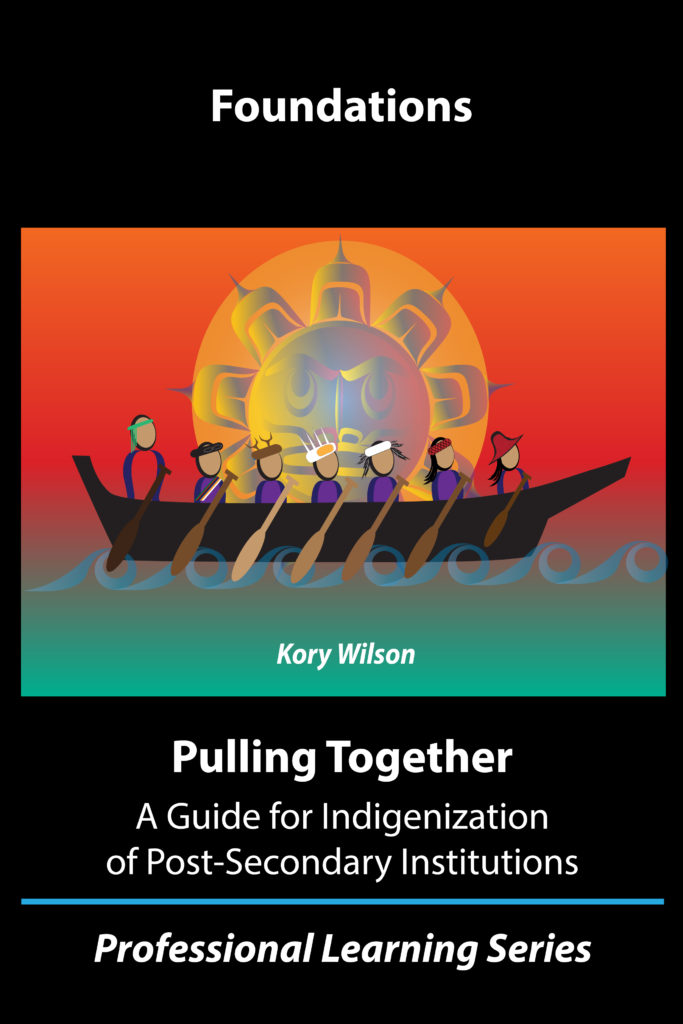 |
Pulling Together: Foundations Guide
The Foundations Guide is part of an open professional learning series developed for staff across post-secondary institutions in British Columbia. These guides are the result of the Indigenization Project, a collaboration between BCcampus and the Ministry of Advanced Education, Skills and Training. The project was supported by a steering committee of Indigenous education leaders from BC universities, colleges, and institutes, the First Nations Education Steering Committee, the Indigenous Adult and Higher Learning Association, and Métis Nation BC. The Foundations Guide explores Indigenous-Canadian relationships from contact to the present. This guide looks at the diversity of Indigenous Peoples and the historical and contemporary realities since contact. You can use the guide to: increase your awareness of Indigenous People, our histories, decolonization, and reconciliation, enhance your knowledge of how Indigenous history and realities in Canada affect relationships and how this may influence how you work with Indigenous people and colleagues in post-secondary education. |
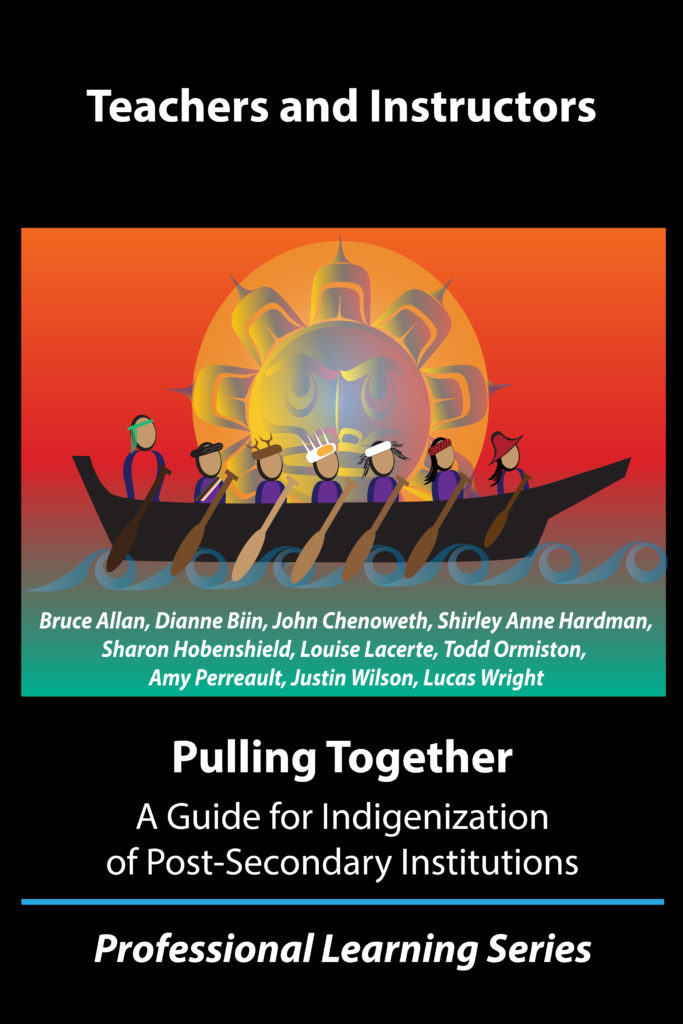 |
Pulling Together: A Guide for Teachers and Instructors
The Guide for Teachers and Instructors explores how to Indigenize one’s practice by building new relationships with Indigenous pedagogy and knowledge. Essentially, this guide mirrors the structure of curriculum design and pedagogical processes to support learning by focusing on three processes – content, context, and application. Content acts as prior knowledge bridges and explores how we got here today. Context grounds you to recognize, respect and honour Indigenous worldviews and suggests ways to invite into your classroom and practice. Application encourages movement forward by providing tangible ideas and next steps for Indigenization. This guide can be used as part of a learning community or in a group learning experience, adapting and augmenting it to include Indigenization pathways at your institution for Indigenous students and communities. |
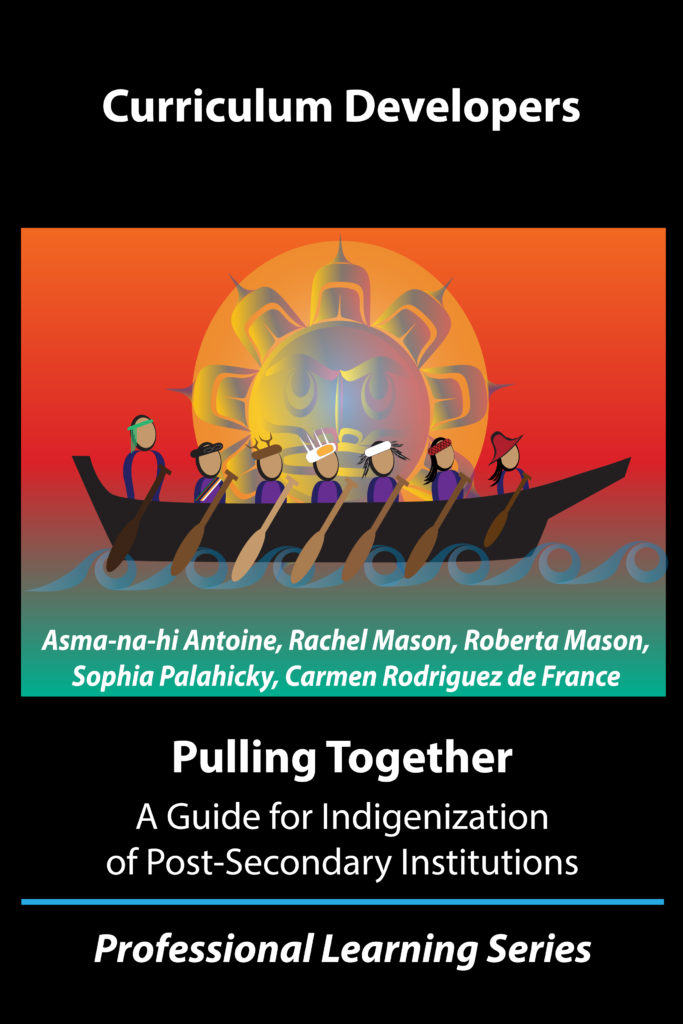 |
Pulling Together: Curriculum Developers Guide
The Curriculum Developers Guide explores Indigenous-Canadian relationships from contact to the present. This guide looks at the diversity of Indigenous Peoples and the historical and contemporary realities since contact. You can use the guide to: increase your awareness of Indigenous People, our histories, decolonization, and reconciliation and enhance your knowledge of how Indigenous history and realities in Canada affect relationships and how this may influence how you work with Indigenous people and colleagues in post-secondary education This guide can be used as part of a learning community or in a group learning experience, adapting and augmenting it to include Indigenization pathways at your institution for Indigenous students and communities. |
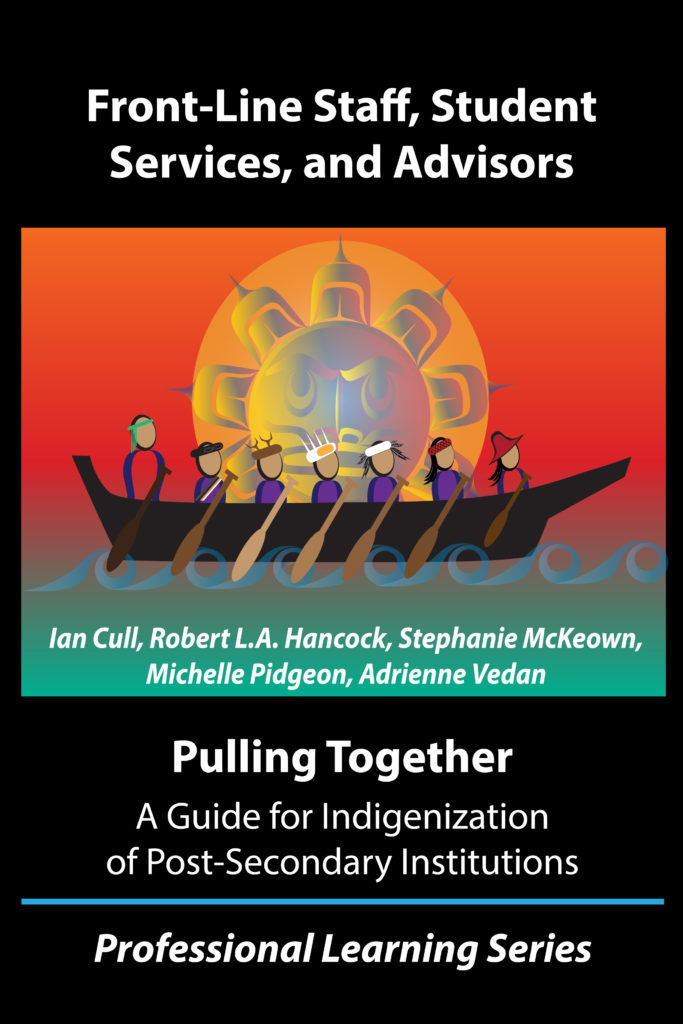 |
Pulling Together: A Guide for Front-Line Staff, Student Services, and Advisors
A Guide for Front-Line Staff, Student Services, and Advisors explores relationships between the institution, students, and Indigenous communities. These relationships are interconnected and are guided by shared values of Indigenization to both improve the educational and employment experiences of all students, faculty, and staff across the institution. It also explores how Elders, Indigenous community members, and community education partners are heard and included in the educational experience. This guide reflects a holistic way to serve Indigenous students. This guide can be used as part of a learning community or in a group learning experience, adapting and augmenting it to include Indigenization pathways at your institution for Indigenous students and communities. |
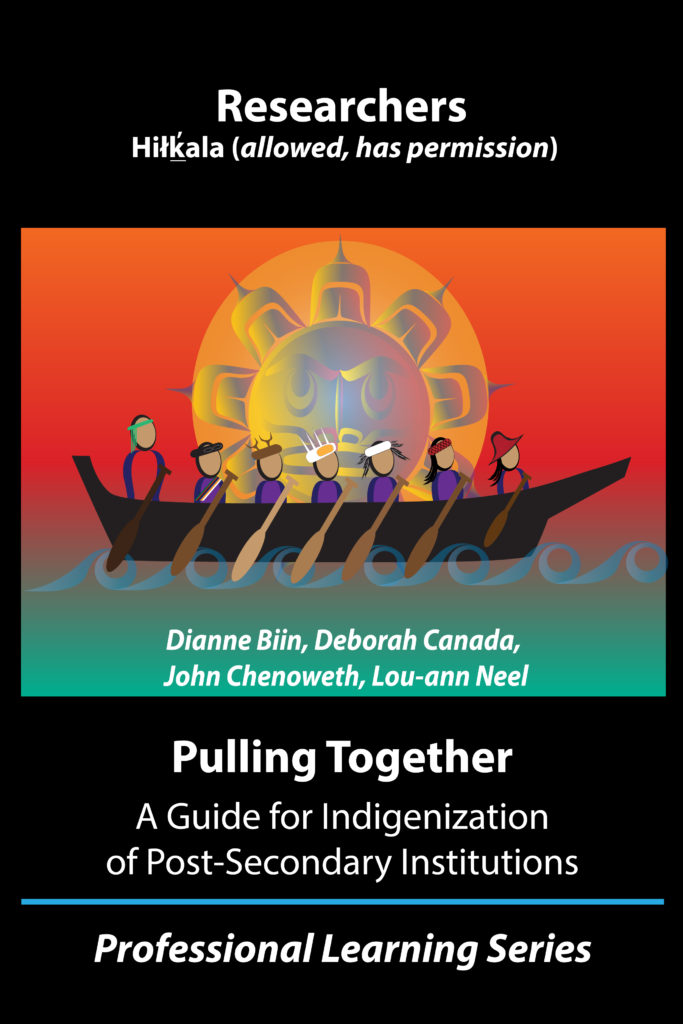 |
Pulling Together: A Guide for Researchers
A Guide for Researchers looks at systemic change of research by exploring research practice and process with Indigenous Peoples and knowledge. This change rests with researchers and teachers of research methods in post-secondary education. The Kwaḱwala term hiłḱala means one who is allowed or has permission. The term reflects a researcher’s responsibility and ongoing role in Indigenous research. While it takes a person a lifetime to develop into this role, it is not done alone: there are helpers, guides, and teachers along the way. This guide is a helper for Indigenous and non-Indigenous researchers and those responsible for post-secondary research. You can use the guide in various ways: To provide a grounding in Indigenization, decolonization, and reconciliation approaches; To practice how to place yourself as an ally or supporter of Indigenous revitalization through research practice; To work with others to discuss how to Indigenize research paradigms to support reconciliation pathways in your post-secondary institution and community. |
 |
Pulling Together: A Guide for Leaders and Administrators
The inspiration for the Leaders and Administrators Guide is the leadership demonstrated at Camosun College in advancing Indigenization. For 12 years, the college, located on the traditional territories of the Lkwungen and W̱SÁNEĆ peoples, has worked collaboratively to make space for Indigenous ways of knowing and being within the institution, paving the way for positive change. The guide contains a number of sections that include reflections and other activities that can be done either individually or collectively. The best way to use the guide is to spend approximately 20 hours (4 hours per section) engaging with the material and resources, which will support your understanding of Indigenization. You will spend time reading and reflecting, and you are encouraged to journal or record your insights, learnings, and reflections. As a leader and learner, you will need to be patient, open, and ready to receive the gifts of Indigenization. |
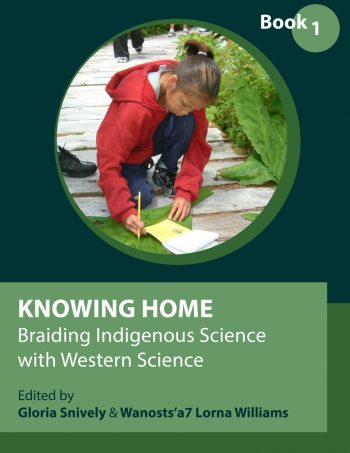 |
Knowing Home: Braiding Indigenous Science with Western Science, Book 1
Since Indigenous peoples have developed time-proven approaches to sustaining both community and environment, Elders and young people are concerned that this rich legacy of Indigenous Science with its wealth of environmental knowledge and the wisdom of previous generations could disappear if it is not respected, studied and understood by today’s children and youth. A perspective where relationships between home place and all other beings that inhabit the earth is vitally important to all residents—both inheritors of ancient Indigenous Knowledge and wisdom, and newcomers who can experience the engagement, joy and promise of science instilled with a sense of place. This book takes a step forward toward preserving and actively using the knowledge, stories, and lessons for today and future generations, and with it a worldview that informs everyday attitudes toward the earth. Knowing Home: Braiding Indigenous Science with Western Science is far more than a set of research papers or curriculum studies. The project outputs include both, but they are incorporated into a theoretical structure that can provide the methodological basis for future efforts that attempt to develop culturally responsive Indigenous Science curricula in home places. It is not just one or two angels to organize, but multiple interwoven approaches and cases that give this project its exceptional importance. Thus, the project outputs have been organized into two books. Book 1 provides an overview of why traditional knowledge and wisdom should be included in the science curriculum, a window into the science and technologies of the Indigenous peoples who live in Northwestern North America, Indigenous worldview, culturally responsive teaching strategies and curriculum models, and evaluative techniques. It is intended that the rich examples and cases, combined with the resources listed in the appendices, will enable teachers and students to explore Indigenous Science examples in the classroom; and in addition, support the development of culturally appropriate curriculum projects. |
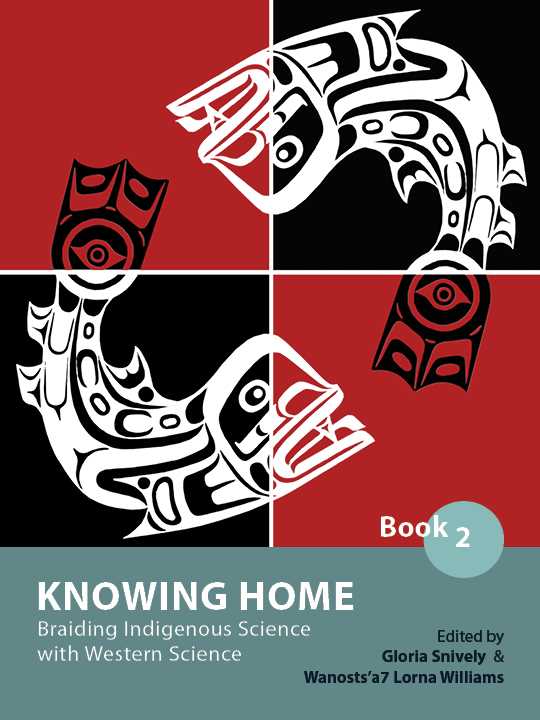 |
Knowing Home: Braiding Indigenous Science with Western Science, Book 2 Knowing Home attempts to capture the creative vision of Indigenous scientific knowledge and technology that is derived from an ecology of a home place. The traditional wisdom component of Indigenous Science—the values and ways of decision-making—assists humans in their relationship with each other, the land and water, and all of creation. Indigenous perspectives have the potential to give insight and guidance to the kind of environmental ethics and deep understanding that we must gain as we attempt to solve the increasingly complex problems of the 21st century.This book provides a window into the vast storehouse of innovations and technologies of the Indigenous peoples who live in Northwestern North America. It is our hope that the Indigenous Science examples, research, and curriculum models will inspire deep reflection regarding the under-representation of Aboriginal students in the sciences. It is intended that the rich examples and cases, combined with the resources listed in the appendices, will enable teachers and students to explore Indigenous Science examples in the classroom, and in addition, support the development of curriculum projects in home places. |
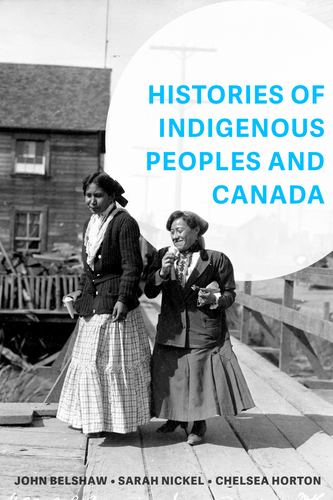 |
Histories of Indigenous Peoples and Canada The preface introduces you to some of the practices and challenges of Indigenous history, focusing on the nature and quality of sources, innovative historical methodologies, and the leading historiographical trends (that is, what historians are thinking very broadly and what they have studied in the last decade or four). It turns, then, to histories of Indigenous peoples in the Western Hemisphere before ca. 1500.The twelve chapters that follow are arranged under three headings: Commerce and Allies, Engaging Colonialism, and Culture Crisis Change Challenge. And there is a thirteenth chapter that brings us deep enough into the twenty-first century to allow a visit with two of the most important recent developments in Canadian civic life: Idle No More and the Truth and Reconciliation Commission. Both of these processes arose from the failures of colonialism and the resilience of Indigenous communities. They reveal, therefore, as much about the history of Canada as they do of the historical experiences of Indigenous peoples. |
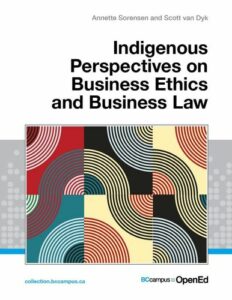 |
Indigenous Perspectives on Business Ethics and Business Law in British Columbia
This book explores business ethics and business law through the lens of Indigenous-settler relations in Canada (with a focus on British Columbia in particular). It aims to fill a gap in business curriculum and support instructors who want to bring Indigenous content into their classes. The book starts by exploring relevant history, focusing on treaties, legislation, and federal government policy. It then looks at business ethics and what it means for businesses to work ethically with Indigenous communities. And finally, the book discusses business law and the requirements and responsibilities for businesses doing work on Indigenous lands. |